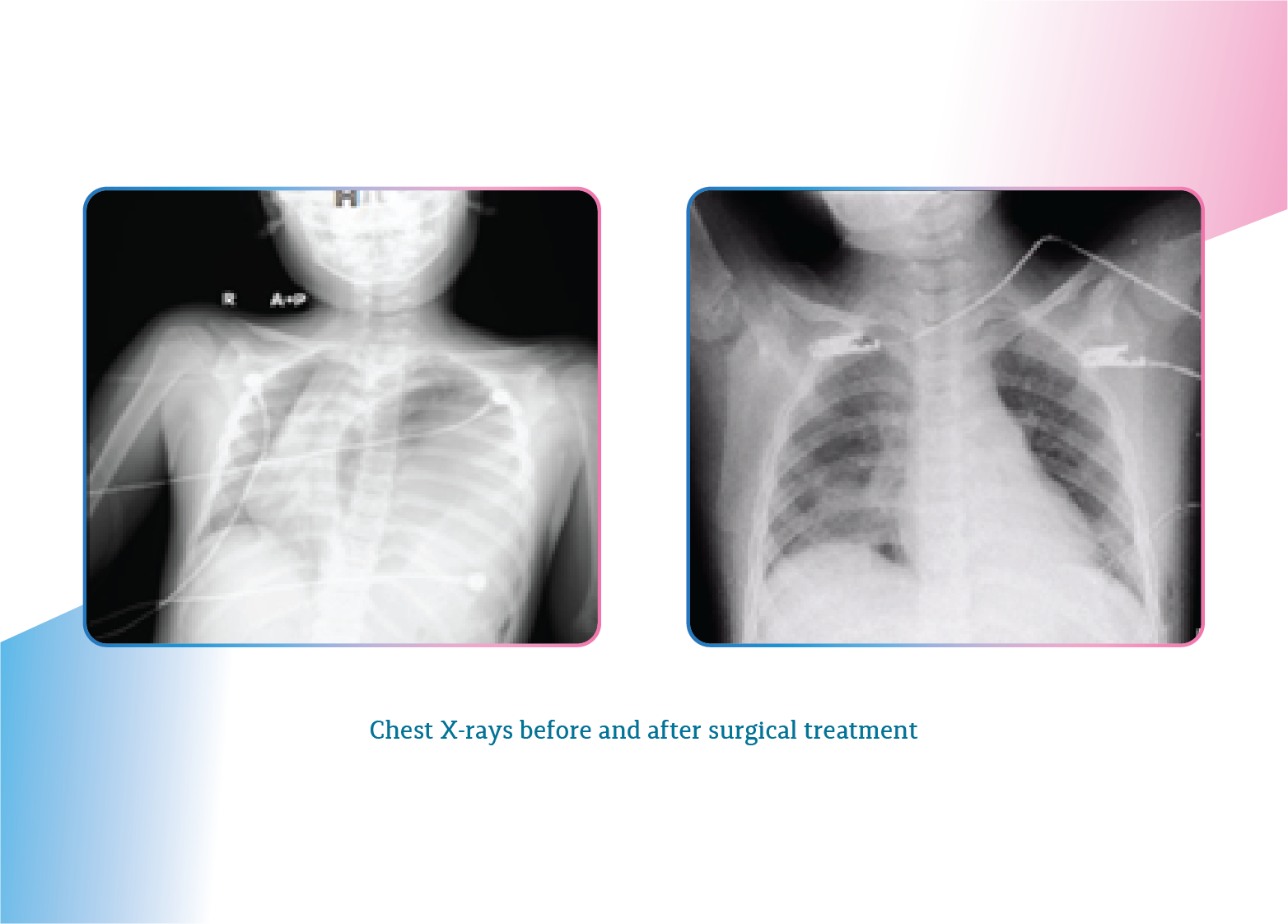Đặt lịch khám
Ngày
Chọn ngày thăm khám
Chuyên khoa
Chọn chuyên khoa bạn muốn thăm khám trong danh sách bên dưới
Bác sĩ
Hãy tham khảo thông tin từ danh sách bên dưới để chọn bác sĩ phù hợp
Giờ
Chọn thời gian thăm khám
Điện thoại
Vui lòng nhập số điện thoại di động để nhận sự hỗ trợ tốt nhất
Thông báo
Vui lòng điền vào thông tin bên dưới
*
*
*
*
*
*
Khẩn cấp
RARE CONGENITAL DIAPHRAGMATIC HERNIA IN CHILDREN
For congenital diaphragmatic hernia (CDH) in children and adolescents, the symptoms of the disease include signs of hernia causing acute cardiopulmonary tamponade, nausea, repeated vomiting, diarrhea, constipation... these are some signs that are very easy to confuse with other diseases. Therefore, when children have these signs, parents should not be subjective but take them to reputable healthcare facilities as soon as possible to receive an accurate and timely diagnosis of the disease, avoiding dangerous complications for children.
After 2 visits, the symptoms of the disease did not improve...
Recently, the American International Hospital (AIH) received a case of congenital diaphragmatic hernia in a 7-year-old male child from Dong Nai. According to the family, the baby initially showed signs such as abdominal pain, repeated vomiting, constipation, mild productive cough, no fever, then was examined and hospitalized locally, was assigned to perform abdominal ultrasound and blood tests but the vomiting and abdominal pain did not improve. On the second day of the illness, the family transferred the child to Ho Chi Minh City to seek medical attention at a pediatric hospital, where he was given a second abdominal ultrasound by the doctor and given an ambulatory prescription. However, the child's condition is still not improved, on the contrary, the child vomits continuously, abdominal pain increases gradually, has difficulty breathing, cannot lie down, and has to sleep sitting upright for several days.
Realizing that the disease was getting more and more serious, on the fourth day of the illness, the family took the child to the American International Hospital (AIH). Here, the child shows signs of fatigue, struggles, pale lips with the room air, SpO2 92-93%, sits and breathes, cannot lie down, blood pressure is difficult to measure. Restores skin color for 3 seconds. The heart sound is clearly with 180 bpm on the right side, no murmurs, the left side is unclear. No bronchial sounds auscultated on the left lung, the left chest protrudes higher than the right, no sign of subcutaneous emphysema. Mild retraction while breathing 48 bpm. Abdominal guarding sign makes it difficult to exam, no abdominal distension. Based on the medical condition and after the examination, Dr. Tran Thi Lam suspected that the child had a left pneumothorax that caused cardiac tamponade/cardiogenic shock. He quickly received emergency transfer, oxygen therapy, IV access establishment and a PA chest X-ray, abdominal ultrasound, urgent point-of-care echocardiography.
X-ray results show that the heart is deviated to the right due to compression but not due to pneumothorax but rather due to stomach protrudes up into the chest wall with large dilation causing compression. The child quickly had a gastric sonde catheterization and was able to draw 680ml of gastric juice with gas. After decompressing stomach, the baby is more alert, the lips are ruddy, SpO2 98%/ cannula oxygen, palpable radial pulse 140 bpm, the blood pressure is 110/80mmHg, mild retraction while breathing 30 bpm, the bronchial sounds of left lung is improved, regular HR 140 bpm, the auscultation of left side is clearer, the abdomen is soft and the baby can lie down. He was immediately consulted with a pediatric surgeon and assigned to emergency surgery. He underwent surgery on the same afternoon and has been discharged from the hospital in a healthy condition.

► Symptoms of diaphragmatic hernia in children
A diaphragmatic hernia is a traumatic pathology of the diaphragm through which intra-abdominal organs move up the thoracic cavity through the openings of the diaphragm. The rate of congenital diaphragmatic hernia (CDH) is about 4.8 per 10,000 live births. Its typical clinical manifestation is respiratory failure that occurs shortly after birth or within the first few hours or days of a newborn's life. With a high mortality rate. Additionally, CDH can occur in children, with a rare rate (<3%).
According to Dr. Pham Cong Luan – Head of Pediatrics – Neonatology Department, congenital diaphragmatic hernia (CDH) in children and adolescents is often missed, and parents are often subjective to the symptoms of the disease because it is easy to confuse with other diseases. Symptoms of CDH in children include signs of acute cardiopulmonary tamponade, nausea, repeated vomiting, diarrhea, constipation, acute gastric distension, subcostal pain, delayed growth, and recurrent respiratory infections, etc. When the above symptoms are present, parents need to take the child to reputable healthcare facilities as soon as possible to be consulted by experts, assigned to perform paraclinical tests and X-rays to properly evaluate the disease, and at the same time have timely treatment, avoiding endangering the child's life.
At the Department of Pediatrics – American International Hospital (AIH), a team of experienced pediatric specialists will directly examine and spend a lot of time on each case, collecting the details of the child's medical history to most accurately evaluate the manifestations of the disease, avoid omitting and limiting dangerous complications, rare diseases... In addition, with modern facilities, quick support for tests, ultrasounds, X-rays, in order to provide necessary indications and timely managements.

Reference:
1. Kadian, YogenderSingh; Rattan, KamalNain; Verma, Manish; Kajal, Pradep (2009). Congenital diaphragmatic hernia: Misdiagnosis in adolescence. Journal of Indian Association of Pediatric Surgeons, 14(1), 31
2. Batts S, Thompson MW, Person DA. Late presentation of diaphragmatic hernia in a Pacific Island pediatric population. Hawaii Med J. 2009 Apr;68(3):59-61. PMID: 19441615
3. Maciej Bagłaj; Urszula Dorobisz (2005). Late-presenting congenital diaphragmatic hernia in children: a literature review., 35(5), 478–488.
4. Banac S, Ahel V, Rozmanić V, Gazdik M, Saina G, Mavrinac B. Prirodena dijafragmalna hernija u veće djece [Congenital diaphragmatic hernia in older children]. Acta Med Croatica. 2004;58(3):225-8. Croatian. PMID: 15503687
After 2 visits, the symptoms of the disease did not improve...
Recently, the American International Hospital (AIH) received a case of congenital diaphragmatic hernia in a 7-year-old male child from Dong Nai. According to the family, the baby initially showed signs such as abdominal pain, repeated vomiting, constipation, mild productive cough, no fever, then was examined and hospitalized locally, was assigned to perform abdominal ultrasound and blood tests but the vomiting and abdominal pain did not improve. On the second day of the illness, the family transferred the child to Ho Chi Minh City to seek medical attention at a pediatric hospital, where he was given a second abdominal ultrasound by the doctor and given an ambulatory prescription. However, the child's condition is still not improved, on the contrary, the child vomits continuously, abdominal pain increases gradually, has difficulty breathing, cannot lie down, and has to sleep sitting upright for several days.
Realizing that the disease was getting more and more serious, on the fourth day of the illness, the family took the child to the American International Hospital (AIH). Here, the child shows signs of fatigue, struggles, pale lips with the room air, SpO2 92-93%, sits and breathes, cannot lie down, blood pressure is difficult to measure. Restores skin color for 3 seconds. The heart sound is clearly with 180 bpm on the right side, no murmurs, the left side is unclear. No bronchial sounds auscultated on the left lung, the left chest protrudes higher than the right, no sign of subcutaneous emphysema. Mild retraction while breathing 48 bpm. Abdominal guarding sign makes it difficult to exam, no abdominal distension. Based on the medical condition and after the examination, Dr. Tran Thi Lam suspected that the child had a left pneumothorax that caused cardiac tamponade/cardiogenic shock. He quickly received emergency transfer, oxygen therapy, IV access establishment and a PA chest X-ray, abdominal ultrasound, urgent point-of-care echocardiography.
X-ray results show that the heart is deviated to the right due to compression but not due to pneumothorax but rather due to stomach protrudes up into the chest wall with large dilation causing compression. The child quickly had a gastric sonde catheterization and was able to draw 680ml of gastric juice with gas. After decompressing stomach, the baby is more alert, the lips are ruddy, SpO2 98%/ cannula oxygen, palpable radial pulse 140 bpm, the blood pressure is 110/80mmHg, mild retraction while breathing 30 bpm, the bronchial sounds of left lung is improved, regular HR 140 bpm, the auscultation of left side is clearer, the abdomen is soft and the baby can lie down. He was immediately consulted with a pediatric surgeon and assigned to emergency surgery. He underwent surgery on the same afternoon and has been discharged from the hospital in a healthy condition.

► Symptoms of diaphragmatic hernia in children
A diaphragmatic hernia is a traumatic pathology of the diaphragm through which intra-abdominal organs move up the thoracic cavity through the openings of the diaphragm. The rate of congenital diaphragmatic hernia (CDH) is about 4.8 per 10,000 live births. Its typical clinical manifestation is respiratory failure that occurs shortly after birth or within the first few hours or days of a newborn's life. With a high mortality rate. Additionally, CDH can occur in children, with a rare rate (<3%).
According to Dr. Pham Cong Luan – Head of Pediatrics – Neonatology Department, congenital diaphragmatic hernia (CDH) in children and adolescents is often missed, and parents are often subjective to the symptoms of the disease because it is easy to confuse with other diseases. Symptoms of CDH in children include signs of acute cardiopulmonary tamponade, nausea, repeated vomiting, diarrhea, constipation, acute gastric distension, subcostal pain, delayed growth, and recurrent respiratory infections, etc. When the above symptoms are present, parents need to take the child to reputable healthcare facilities as soon as possible to be consulted by experts, assigned to perform paraclinical tests and X-rays to properly evaluate the disease, and at the same time have timely treatment, avoiding endangering the child's life.
At the Department of Pediatrics – American International Hospital (AIH), a team of experienced pediatric specialists will directly examine and spend a lot of time on each case, collecting the details of the child's medical history to most accurately evaluate the manifestations of the disease, avoid omitting and limiting dangerous complications, rare diseases... In addition, with modern facilities, quick support for tests, ultrasounds, X-rays, in order to provide necessary indications and timely managements.

Reference:
1. Kadian, YogenderSingh; Rattan, KamalNain; Verma, Manish; Kajal, Pradep (2009). Congenital diaphragmatic hernia: Misdiagnosis in adolescence. Journal of Indian Association of Pediatric Surgeons, 14(1), 31
2. Batts S, Thompson MW, Person DA. Late presentation of diaphragmatic hernia in a Pacific Island pediatric population. Hawaii Med J. 2009 Apr;68(3):59-61. PMID: 19441615
3. Maciej Bagłaj; Urszula Dorobisz (2005). Late-presenting congenital diaphragmatic hernia in children: a literature review., 35(5), 478–488.
4. Banac S, Ahel V, Rozmanić V, Gazdik M, Saina G, Mavrinac B. Prirodena dijafragmalna hernija u veće djece [Congenital diaphragmatic hernia in older children]. Acta Med Croatica. 2004;58(3):225-8. Croatian. PMID: 15503687
--------------------
For checkup and consultation at AIH:
☎️ Hotline: (028) 3910 9999
🌏 Website: www.aih.com.vn
📍 Address: (Entrance from 199 Nguyen Hoang Street) No.6, Bac Nam 3 Street, An Phu Ward, Thu Duc City, Ho Chi Minh City.
Tìm kiếm
Tin tức
Bác sĩ














Để lại bình luận